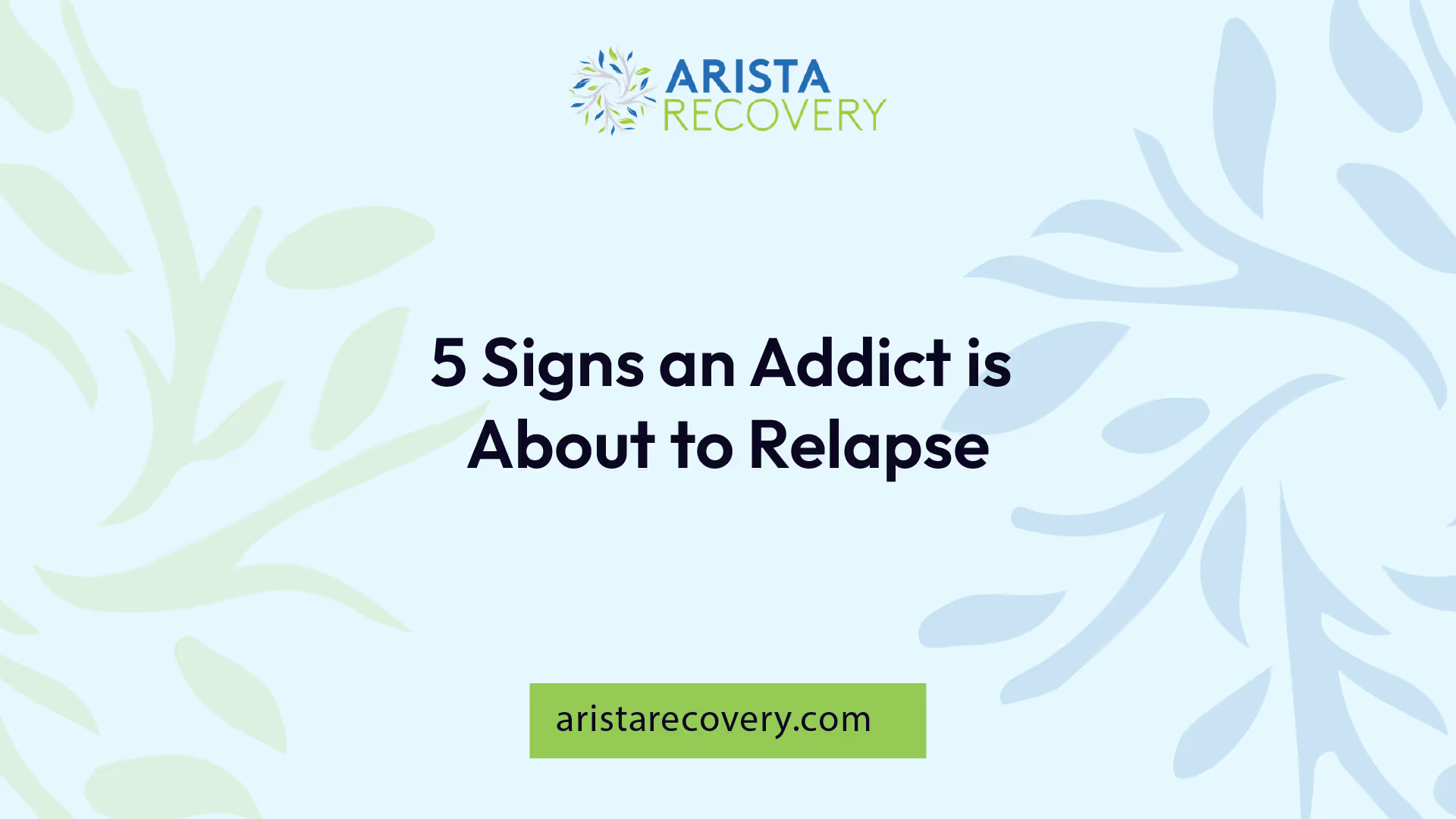5 Signs an Addict is About to Relapse

Understanding Relapse in Addiction Recovery
Understanding the stages of relapse is essential for effective addiction recovery. It generalizes the phases that individuals may experience as they navigate their recovery journey. Recognizing these stages enables individuals and their support systems to intervene early and foster healthier coping strategies.

Relapse Stages
Relapse can be divided into three distinct stages: emotional relapse, mental relapse, and physical relapse.
Relapse StageDescriptionWarning SignsEmotional RelapseThis stage is marked by emotional distress and signs of neglecting self-care.Bottling up emotions, isolating, neglecting meetings, focusing on others, poor self-care habits. (NCBI)Mental RelapseA conflict arises between the desire to maintain sobriety and cravings for substance use.Cravings, reminiscing about past use, justifying use, planning a relapse, and seeking opportunities to use. (NCBI)Physical RelapseThis stage culminates in the actual use of substances after a period of abstinence.Returning to substance use, which is typically preceded by emotional and mental relapses. Understanding you may need to rehearse high-risk scenarios is vital. (NCBI)
Impact of Stress on Relapse
Stress plays a significant role in the potential for relapse among individuals in recovery. The connection between stress, cravings, and drug-seeking behavior is well-documented.
Understanding these aspects of relapse is crucial for recognizing the early signs and modifying behavior to prevent a return to substance use. For more information on the signs that indicate an impending relapse, consider reviewing the “five signs an addict is about to relapse.”
Recognizing Warning Signs
Identifying the warning signs of impending relapse is crucial for anyone in recovery from addiction. The following sections outline the emotional, mental, and physical signs that may indicate an individual is on the brink of a relapse.
Emotional Relapse Signs
Emotional relapse is characterized by specific behaviors and feelings that signal potential relapse. Key signs include:
Emotional Relapse SignsDescriptionIsolationAvoiding contact with supportive friends or family.Neglecting MeetingsMissing or disengaging in support-related gatherings.Focus on OthersConcentrating on others' issues rather than personal struggles.Poor Self-CareIgnoring basic personal health and wellness needs.
For more information on navigating emotional challenges during recovery, consider reading about four important things about relapse.
Mental Relapse Signs
Mental relapse involves an internal conflict between the desire to remain sober and the temptation to return to substance use. Signs may include:
Mental Relapse SignsDescriptionCravingsIntense urges to engage in substance use.Thoughts of Past UseReflecting on previous substance-using experiences.Minimizing ConsequencesRationalizing past substance-related decisions.Planning to RelapseCreating strategies to use substances discreetly.
For additional insight on the mental aspects of recovery, check out the topic on four triggers for relapse in recovery.
Physical Relapse Signs
Physical relapse is the point where an individual returns to substance use. Understanding this stage is vital, as it often follows emotional and mental relapses. Key points include:
Physical Relapse SignsDescriptionReturn to UseResuming substance consumption.Risk SituationsEngaging in environments that promote substance use.Coping Skills DeficiencyLacking the tools to manage high-risk scenarios.
Preventing physical relapse is critical. For strategies on how to rebound from addiction relapse, you can refer to our article on rebounding from addiction relapse. Understanding these warning signs can help individuals stay vigilant and proactive in their recovery journey.
Strategies for Relapse Prevention
Effective strategies for preventing a relapse are essential for maintaining long-term recovery from addiction. Several approaches can help individuals stay on track and avoid the five signs an addict is about to relapse. Below are three key strategies: cognitive therapy, the importance of self-care, and peer support programs.
Cognitive Therapy
Cognitive therapy is a vital tool for changing negative thinking and developing healthy coping skills in relapse prevention. This therapeutic approach focuses on identifying and modifying destructive thought patterns that may trigger relapse. Studies have shown that cognitive therapy can effectively aid in preventing relapse by addressing obstacles in recovery such as pessimism and self-doubt [3].
Key Benefits of Cognitive TherapyChanges negative thinking patternsDevelops effective coping strategiesHelps to recognize and manage triggers
Importance of Self-Care
Practicing self-care is crucial for individuals in recovery from addiction. Self-care strategies, particularly mind-body relaxation techniques, play a significant role in reducing stress and eliminating triggers that may lead to relapse. Methods such as meditation, yoga, and deep breathing can help individuals cope with anxiety and tension, which are critical in promoting long-term recovery.
Self-Care Techniques for RecoveryMindfulness meditationRegular physical activityHealthy eating habitsAdequate sleep
Peer Support Programs
Peer support programs, such as Narcotics Anonymous (NA), Alcoholics Anonymous (AA), and SMART Recovery, are commonly utilized avenues that emphasize mutual support among individuals in recovery. These programs encourage regular meetings and offer guidance from mentors. While evidence for their efficacy in preventing relapses is limited, the community support they provide can be instrumental in maintaining accountability and encouragement during challenging times.
Characteristics of Peer Support ProgramsFrequent meetingsStructured recovery programsAccess to mentors and sponsors
Incorporating these strategies into an individual's recovery plan can significantly reduce the risk of relapse and help maintain a healthy and sober lifestyle. By focusing on cognitive therapy, self-care, and peer support, individuals can navigate their recovery journey with greater resilience and awareness. For further insights, explore our articles on four important things about relapse and rebounding from addiction relapse.
Factors Influencing Relapse
Understanding the factors that can influence relapse is crucial in recognizing the warning signs of addiction return. These factors include family dynamics, social support, and stress exposure.
Role of Family Dynamics
Family dynamics play a significant role in the likelihood of relapse. Research indicates that family expressed emotions are positively correlated with the frequency of relapse (r = 0.26, P = 0.011). Conversely, perceived social support from family shows a significant negative relationship with relapse frequency (r = -0.34, P = 0.001). Together, these factors can account for 12% of the total variance in relapse frequency.
This highlights the importance of a supportive family environment in addiction recovery. Family members who openly express their emotions, whether positive or negative, can impact an individual's stability and sobriety.
Influence of Social Support
The availability of social support is another vital element in preventing relapse. A lack of support from friends, family, and the community can significantly decrease a person's ability to cope with stressors, making them more susceptible to relapse. Establishing a strong support network enhances addiction treatment outcomes [2].
Social connections serve as a buffer against feelings of isolation and can provide encouragement during difficult times. Specifically, individuals who feel supported are less likely to engage in substance use again, while those who lack social interaction are at greater risk of experiencing a return to addiction.
Impact of Stress Exposure
Chronic stress is a known risk factor for addiction and relapse. Epidemiological studies have shown that stress exposure increases vulnerability to relapse by enhancing drug-seeking behaviors. Early life stress and accumulated adversity can particularly impact addiction risk.
Factors such as trauma, loss, and chronic distress have been linked to a higher likelihood of substance use and abuse. The body's response to stress involves various brain regions, including the amygdala, hippocampus, and prefrontal cortex. These areas help evaluate stress stimuli and mediate responses that could lead to substance use [5].
Understanding the intricate relationship between family dynamics, social support, and stress exposure can facilitate better prevention strategies for addiction relapse. For further reading on this topic, consider exploring our article on four important things about relapse or the distinction between slip and relapse.
Learning from Relapse
Understanding relapse can provide valuable insights into the recovery process. By examining different perspectives and models, individuals can better navigate their journey toward sustained sobriety.
Learning Model Perspective
The learning model perspective frames relapse as an opportunity for individuals to learn from mistakes. It views relapse as part of a process where individuals experience successive approximations toward achieving successful behavior change. When a relapse occurs, it triggers a recycling process through various stages of change, facilitating a deeper understanding and improved strategies for maintaining long-term recovery.
Biopsychosocial Model
In 1985, researchers Marlatt and Gordon introduced the biopsychosocial model to understand relapse within the context of cognitive behavioral principles. This model emphasizes that relapse can occur when individuals fail to cope with cognitive distortions or cues that undermine their confidence in staying abstinent. This holistic view considers biological, psychological, and social factors contributing to an addict's experience, illustrating the complexity of the addiction recovery process.
Successful Behavior Change through Relapse
Relapse can happen at various stages of the change process. It may occur shortly after someone initiates a change attempt or after a prolonged period of successfully modified behavior. The occurrence of relapse can trigger a recycling process through different stages of change, ultimately leading to a better understanding and approach to achieving sustainable behavior change [6]. This perspective reinforces the idea that experiencing relapse does not signify failure but rather an opportunity for growth and learning.
By considering these models and perspectives, individuals can glean insights that support their journey in understanding the five signs an addict is about to relapse, ultimately fostering resilience and effective strategies for recovery. For more information about coping with relapse, visit rebounding from addiction relapse and explore the difference between slip and relapse.
References
[2]:
[3]:
[4]:
[5]:
[6]:
You’re not alone in this.
When mental health challenges and addiction intersect, it can feel isolating. At Arista, we offer compassionate, evidence-based, and trauma-informed care to help you heal, grow, and move forward.
You’re not alone in this.
When mental health challenges and addiction intersect, it can feel isolating. At Arista, we offer compassionate, evidence-based, and trauma-informed care to help you heal, grow, and move forward.
Support that moves with you.
You’ve taken a brave first step. At Arista Recovery, we’re here to help you continue with best-in-class care designed for long-term healing and support.
.webp)






